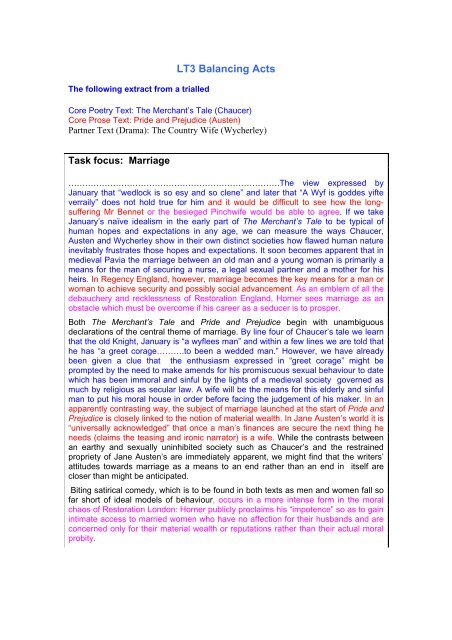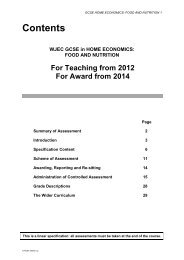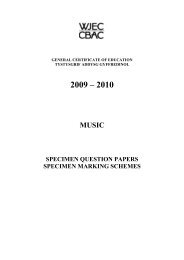LT3: Period and Genre Study - WJEC
LT3: Period and Genre Study - WJEC
LT3: Period and Genre Study - WJEC
You also want an ePaper? Increase the reach of your titles
YUMPU automatically turns print PDFs into web optimized ePapers that Google loves.
The following extract from a trialled<br />
<strong>LT3</strong> Balancing Acts<br />
Core Poetry Text: The Merchant’s Tale (Chaucer)<br />
Core Prose Text: Pride <strong>and</strong> Prejudice (Austen)<br />
Partner Text (Drama): The Country Wife (Wycherley)<br />
Task focus: Marriage<br />
………………………………………………………………….The view expressed by<br />
January that “wedlock is so esy <strong>and</strong> so clene” <strong>and</strong> later that “A Wyf is goddes yifte<br />
verraily” does not hold true for him <strong>and</strong> it would be difficult to see how the longsuffering<br />
Mr Bennet or the besieged Pinchwife would be able to agree. If we take<br />
January’s naïve idealism in the early part of The Merchant’s Tale to be typical of<br />
human hopes <strong>and</strong> expectations in any age, we can measure the ways Chaucer,<br />
Austen <strong>and</strong> Wycherley show in their own distinct societies how flawed human nature<br />
inevitably frustrates those hopes <strong>and</strong> expectations. It soon becomes apparent that in<br />
medieval Pavia the marriage between an old man <strong>and</strong> a young woman is primarily a<br />
means for the man of securing a nurse, a legal sexual partner <strong>and</strong> a mother for his<br />
heirs. In Regency Engl<strong>and</strong>, however, marriage becomes the key means for a man or<br />
woman to achieve security <strong>and</strong> possibly social advancement. As an emblem of all the<br />
debauchery <strong>and</strong> recklessness of Restoration Engl<strong>and</strong>, Horner sees marriage as an<br />
obstacle which must be overcome if his career as a seducer is to prosper.<br />
Both The Merchant’s Tale <strong>and</strong> Pride <strong>and</strong> Prejudice begin with unambiguous<br />
declarations of the central theme of marriage. By line four of Chaucer’s tale we learn<br />
that the old Knight, January is “a wyflees man” <strong>and</strong> within a few lines we are told that<br />
he has “a greet corage……….to been a wedded man.” However, we have already<br />
been given a clue that the enthusiasm expressed in “greet corage” might be<br />
prompted by the need to make amends for his promiscuous sexual behaviour to date<br />
which has been immoral <strong>and</strong> sinful by the lights of a medieval society governed as<br />
much by religious as secular law. A wife will be the means for this elderly <strong>and</strong> sinful<br />
man to put his moral house in order before facing the judgement of his maker. In an<br />
apparently contrasting way, the subject of marriage launched at the start of Pride <strong>and</strong><br />
Prejudice is closely linked to the notion of material wealth. In Jane Austen’s world it is<br />
“universally acknowledged” that once a man’s finances are secure the next thing he<br />
needs (claims the teasing <strong>and</strong> ironic narrator) is a wife. While the contrasts between<br />
an earthy <strong>and</strong> sexually uninhibited society such as Chaucer’s <strong>and</strong> the restrained<br />
propriety of Jane Austen’s are immediately apparent, we might find that the writers’<br />
attitudes towards marriage as a means to an end rather than an end in itself are<br />
closer than might be anticipated.<br />
Biting satirical comedy, which is to be found in both texts as men <strong>and</strong> women fall so<br />
far short of ideal models of behaviour, occurs in a more intense form in the moral<br />
chaos of Restoration London: Horner publicly proclaims his “impotence” so as to gain<br />
intimate access to married women who have no affection for their husb<strong>and</strong>s <strong>and</strong> are<br />
concerned only for their material wealth or reputations rather than their actual moral<br />
probity.

















